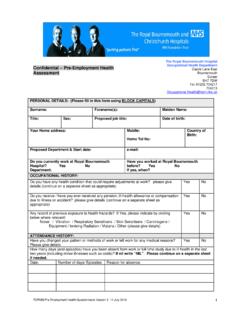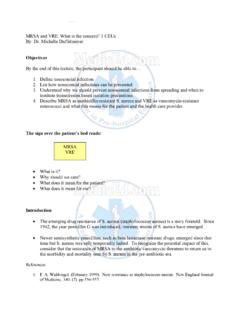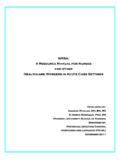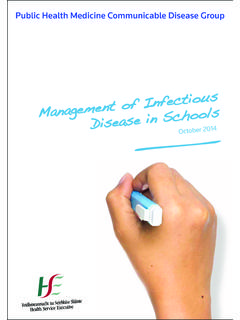Transcription of Advice about MRSA for people not in hospital
1 Advice about MRSA. for people not in hospital If you have MRSA, this leaflet tells you about things you should do in your everyday life. Easy read This booklet is about a germ called MRSA. Advice for those It is an Easy Read version of a booklet affected by MRSA. outside of hospital called Advice for those affected by If you have MRSA this lea et provides information and Advice for managing MRSA outside of hospital . your day-to-day life. There are some difficult words in this booklet. So there is a list of these words and what they mean on page 27. These words are in blue letters in the booklet. You might like to have someone to support you when you look at the booklet. What is in this booklet? about MRSA .. 2. How does MRSA get into your body?.. 4. Who has MRSA? .. 5. What happens if you have MRSA? .. 6. Treatment at home.
2 8. What can you do yourself? .. 9. Some answers to your questions .. 12. At home .. 22. How to find out more .. 26. What the words mean .. 27. 1. about MRSA. This booklet is about a germ called MRSA. There are lots of different types or families of germs. Some of these germs are on our bodies. Some are in the world around us. One of these families of germs is called Staphylococcus aureus, or S. aureus for short. MRSA is a germ which is part of the S. aureus family. about S. aureus Germs in the S. aureus family usually live on damp parts of the outside of your body. Places like your: nose armpits groin. These germs are sometimes on other parts of your body like your hands. 2. The germs do not usually cause any problems, but they can sometimes cause infections. An infection is when germs attack your body and make you feel sore, hot and unwell.
3 The germs can cause problems like pimples and boils on your skin. But if they get inside your body they can cause more serious infections. Doctors can treat these infections with drugs called antibiotics. When doctors cannot treat these germs with an antibiotic called meticillin it is called MRSA. MRSA. MRSA stands for meticillin resistant S. aureus. Resistant' means that germs are not killed by meticillin. But doctors can treat MRSA with some other sorts of antibiotics. 3. How does MRSA get into your body? MRSA germs are in lots of places. But they are most common in hospitals and care homes. The germs do not usually harm people . But if they get into your body through a break in the skin they can cause problems. people with breaks in their skin like sores, wounds from operations or holes for medical tubes should keep them covered with a dressing.
4 This helps to stop MRSA germs getting into the body. people should also always wash their hands before and after changing dressings or touching wounds. This is because germs are often passed on by hands. Normal touching like holding hands or hugging does not usually cause any problems. 4. Who has MRSA? There are 2 sorts of people with MRSA: people colonised with MRSA. Some people have MRSA on their skin or in their nose that does not make them ill. These people are said to be colonised with MRSA. people may carry MRSA for a few hours, days, weeks, or even for their whole lives. Most people do not know that they are carrying MRSA. people infected with MRSA. If people become ill with MRSA they are said to be infected with MRSA. The MRSA will have got into a person's body through a sore or wound. Sometimes it can cause serious chest or blood infections.
5 5. What happens if you have MRSA? people colonised with MRSA. If you are colonised with MRSA you do not usually need treatment. But if you need medical treatment or an operation, your doctor or other health worker will decide if you need to be decolonised first. Decolonised' means getting rid of as much of the MRSA as possible. You can be decolonised in hospital or at home. This usually means: washing your body with special body wash washing your hair with special shampoo using a special cream in your nose. These treatments are to get rid of MRSA. 6. people infected with MRSA. If you are being treated for an MRSA infection, you may be given antibiotics. You might take these antibiotics: through your mouth by rubbing them into your skin through a drip. A drip' is a tube that puts liquids or medicines into your blood.
6 There are some special things you need to do while you are being decolonised or treated for an infection. This will help your treatment work better. We tell you what you need to do on pages 24 and 25. 7. Treatment at home Your doctor or health worker will decide if it is safe for you to be decolonised or treated for an MRSA infection at home. It is usually safe to be treated at home. Being treated at home helps hospitals to stop MRSA spreading. It is very important to remember to do exactly what your doctor or health worker tells you. And to make sure you do it for as long as they say you should. 8. What can you do yourself? It is up to everyone to help stop the spread of MRSA. This means everyone who comes into contact with the NHS, including: patients health workers hospital managers visitors to hospitals.
7 You can play an important part in the fight against MRSA. We tell you how you can do this on the next pages. 9. Be careful about being clean You should wash your hands often. Be sure to wash your hands before and after you touch: wounds dressings drips or tubes that go into your or another person's body. 10. Be careful looking after wounds If you have MRSA there is a small risk to some other people . There is a small risk to other people if they have: wounds tubes which take drugs or other liquids straight into their blood a catheter (a tube which takes wee away from their body). bad skin problems. It is very important that both you and the other person keep your hands clean and wounds and sores are well covered. 11. Some answers to your questions How will I know if I am colonised? If you are colonised you will not have any symptoms because the germ has not caused an infection.
8 ( Symptoms' are the aches, pains or feelings you get that tell you that you are ill.) So you will probably not know if you are colonised unless you have had a test for the germ. How will I know if I have an infection? If you develop an infection you may feel: unwell hot tired that you do not want to eat much. 12. There are 5 signs that can help you spot any wound infection. This includes an MRSA infection: 1. the wound feels hot 2. redness 3. pus (thick yellow liquid in the wound). 4. swelling 5. pain. If you think you may have an MRSA. infection or if you have any doubts at all, you should ask your doctor or NHS. Direct for Advice . 13. Am I a risk to other people ? If you have MRSA, you are not usually a risk to healthy people . This includes older people , pregnant women, children and babies. What about my personal life?
9 You can carry on your normal life with your partner and friends. You can still have sex and touch other people . If you have MRSA, your partner could become colonised. But this is unlikely to be dangerous for them. You must finish your treatment properly to give you the best chance of getting rid of the MRSA germ. Getting rid of the germ means you are less likely to pass it on to others. What if I am pregnant or breastfeeding? If you are pregnant, fit and healthy, there are no extra risks if you have MRSA. It is safe for you to breastfeed your baby. 14. But if you have any of these symptoms, you should tell your doctor, midwife or health visitor: painful breasts red patches or lumps around your breasts symptoms you get with flu like a high temperature. These symptoms could show that you have an infection of the breasts called mastitis.
10 Mastitis may be due to MRSA or to another germ. Can my child go to nursery or school? If your child has MRSA they can go to nursery or to school as normal. You do not have to tell the school or nursery about the MRSA. 15. Can I live normally and go to work? If you have MRSA it does not stop you doing everyday things like: meeting friends shopping going to the gym swimming. You should not go swimming if you have a sore or open wound. You should not swim with an open wound even if you do not have MRSA. 16. You should cover sores and wounds with a waterproof dressing if you are doing any sport. You will usually be able to go to work as normal. If you work in healthcare and have an MRSA infection, you should ask your doctor for Advice . 17. Do I have to tell people I have MRSA? You do not have to tell anyone that you have MRSA.









